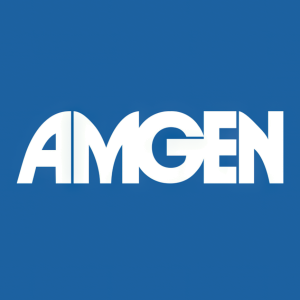AMGEN PRESENTS NEW TARLATAMAB CLINICAL DATA AT WCLC 2022
Rhea-AI Summary
Amgen presented promising Phase 1 results for tarlatamab, a bispecific T-cell engager targeting DLL3, at the IASLC 2022 conference. The study on 106 heavily pretreated small cell lung cancer (SCLC) patients reported a confirmed overall response rate (ORR) of 23% and a median duration of response of 13 months. The median overall survival was noted at 13.2 months, indicating durability in response. Less than 4% discontinued due to adverse events, positioning tarlatamab as a strong candidate for a Phase 2 study aimed at SCLC, where treatment options are limited.
Positive
- Confirmed overall response rate (ORR) of 23% in heavily pretreated SCLC patients.
- Median duration of response of 13 months and median overall survival of 13.2 months.
- Low discontinuation rate due to treatment-related adverse events (4%).
- Potential for Phase 2 study enrollment currently underway.
Negative
- Treatment-related adverse events (TRAEs) occurred in 92% of patients, with 31% being grade ≥ 3.
News Market Reaction
On the day this news was published, AMGN gained 0.42%, reflecting a mild positive market reaction.
Data tracked by StockTitan Argus on the day of publication.
Phase 1 Tarlatamab Study Showed Encouraging Antitumor Activity With Median Duration of Response of 13 Months in Small Cell Lung Cancer
No Approved Treatment Options Available to Patients in Third-line Setting
THOUSAND OAKS, Calif., Aug. 8, 2022 /PRNewswire/ -- Amgen (NASDAQ: AMGN) today announced new data from the DeLLphi300 clinical trial, a Phase 1 dose exploration and expansion study evaluating the safety and efficacy of investigational tarlatamab, a potential first-in-class half-life extended bispecific T-cell engager (HLE BiTE®) molecule targeting delta-like ligand 3 (DLL3), in small cell lung cancer (SCLC). Updated data from the ongoing Phase 1 study were presented at the International Association for the Study of Lung Cancer (IASLC) 2022 World Conference on Lung Cancer (WCLC) in Vienna, Austria.
"Small cell lung cancer is one of the most devastating and aggressive solid tumor cancers. The disease has lacked effective treatments with no therapies specifically approved to treat patients in the third-line setting," said David M. Reese, M.D., executive vice president of Research and Development at Amgen. "Our Phase 1 data for tarlatamab presented earlier today at WCLC continues to demonstrate exciting antitumor activity with remarkable response durability in heavily pre-treated patients. We are encouraged by the overall survival of 13.2 months."
In heavily pretreated patients with SCLC (n=106), a population with few treatment options beyond first-line, investigational tarlatamab demonstrated encouraging antitumor activity with notable response durability. Tarlatamab delivered a confirmed ORR of
Based on these data, a potentially registrational Phase 2 study of tarlatamab in the third-line treatment of SCLC is currently enrolling patients. Additional studies investigating tarlatamab are underway, including DeLLphi-303, a Phase 1b study testing tarlatamab in combination with standard of care in first-line SCLC and a Phase 1b study in de novo or treatment-emergent neuroendocrine prostate cancer.
About Tarlatamab
Tarlatamab is an investigational potential first-in-class half-life extended bispecific T-cell engager (BiTE) molecule that is uniquely designed to target delta-like ligand 3 (DLL3) in neuroendocrine cancers, such as small cell lung cancer (SCLC) and neuroendocrine prostate cancer – both of which have high unmet medical needs.1,2 DLL3 is highly upregulated on the cell surface of neuroendocrine tumors and rarely expressed on nonmalignant cells, making it a novel target for investigating a BiTE immuno-oncology molecule.2,3,4
Tarlatamab is being investigated in multiple studies, including DeLLphi-301, a potentially registrational Phase 2 study in relapsed/refractory SCLC; DeLLphi-303, a Phase 1b study testing tarlatamab in combination with standard of care therapies in first-line SCLC; DeLLphi-302, a Phase 1b combination study with AMG 404 in second-line or later SCLC; and DeLLpro-300, a Phase 1b study in de novo or treatment-emergent neuroendocrine prostate cancer.
About Small Cell Lung Cancer
Small cell lung cancer (SCLC) is a particularly aggressive form of the disease that accounts for about
The five-year survival rate for advanced SCLC remains low at
About BiTE® Technology
BiTE® (bispecific T-cell engager) technology is a targeted immuno-oncology platform that is designed to engage patient's own T cells to any tumor-specific antigen, activating the cytotoxic potential of T cells to eliminate detectable cancer. The BiTE immuno-oncology platform has the potential to treat different tumor types through tumor-specific antigens.
The BiTE platform has a goal of leading to off-the-shelf solutions, which have the potential to make innovative T-cell treatment available to all providers when their patients need it. Amgen is advancing a number of BiTE molecules across a broad range of hematologic malignancies and solid tumors, further investigating BiTE technology with the goal of enhancing patient experience and therapeutic potential.
To learn more about BiTE® technology, visit www.AmgenBiTETechnology.com.
About Amgen Oncology
At Amgen Oncology, our mission to serve patients drives all that we do. That's why we're relentlessly focused on accelerating the delivery of medicines that have the potential to empower all angles of care and transform lives of people with cancer.
For the last four decades, we have been dedicated to discovering the firsts that matter in oncology and to finding ways to reduce the burden of cancer. Building on our heritage, Amgen continues to advance the largest pipeline in the Company's history, moving with great speed to advance those innovations for the patients who need them.
For more information, follow us on www.twitter.com/amgenoncology.
About Amgen
Amgen is committed to unlocking the potential of biology for patients suffering from serious illnesses by discovering, developing, manufacturing and delivering innovative human therapeutics. This approach begins by using tools like advanced human genetics to unravel the complexities of disease and understand the fundamentals of human biology.
Amgen focuses on areas of high unmet medical need and leverages its expertise to strive for solutions that improve health outcomes and dramatically improve people's lives. A biotechnology pioneer since 1980, Amgen has grown to be one of the world's leading independent biotechnology companies, has reached millions of patients around the world and is developing a pipeline of medicines with breakaway potential.
Amgen is one of the 30 companies that comprise the Dow Jones Industrial Average and is also part of the Nasdaq-100 index. In 2021, Amgen was named one of the 25 World's Best Workplaces™ by Fortune and Great Place to Work™ and one of the 100 most sustainable companies in the world by Barron's.
For more information, visit www.amgen.com and follow us on www.twitter.com/amgen.
Forward-Looking Statements
This news release contains forward-looking statements that are based on the current expectations and beliefs of Amgen. All statements, other than statements of historical fact, are statements that could be deemed forward-looking statements, including any statements on the outcome, benefits and synergies of collaborations, or potential collaborations, with any other company (including BeiGene, Ltd., Kyowa-Kirin Co., Ltd., or any collaboration to manufacture therapeutic antibodies against COVID-19), the performance of Otezla® (apremilast) (including anticipated Otezla sales growth and the timing of non-GAAP EPS accretion), the Five Prime Therapeutics, Inc. acquisition, or the Teneobio, Inc. acquisition, or the recently announced proposed acquisition of ChemoCentryx, Inc., as well as estimates of revenues, operating margins, capital expenditures, cash, other financial metrics, expected legal, arbitration, political, regulatory or clinical results or practices, customer and prescriber patterns or practices, reimbursement activities and outcomes, effects of pandemics or other widespread health problems such as the ongoing COVID-19 pandemic on our business, and other such estimates and results. Forward-looking statements involve significant risks and uncertainties, including those discussed below and more fully described in the Securities and Exchange Commission reports filed by Amgen, including our most recent annual report on Form 10-K and any subsequent periodic reports on Form 10-Q and current reports on Form 8-K. Unless otherwise noted, Amgen is providing this information as of the date of this news release and does not undertake any obligation to update any forward-looking statements contained in this document as a result of new information, future events or otherwise.
No forward-looking statement can be guaranteed and actual results may differ materially from those we project. Discovery or identification of new product candidates or development of new indications for existing products cannot be guaranteed and movement from concept to product is uncertain; consequently, there can be no guarantee that any particular product candidate or development of a new indication for an existing product will be successful and become a commercial product. Further, preclinical results do not guarantee safe and effective performance of product candidates in humans. The complexity of the human body cannot be perfectly, or sometimes, even adequately modeled by computer or cell culture systems or animal models. The length of time that it takes for us to complete clinical trials and obtain regulatory approval for product marketing has in the past varied and we expect similar variability in the future. Even when clinical trials are successful, regulatory authorities may question the sufficiency for approval of the trial endpoints we have selected. We develop product candidates internally and through licensing collaborations, partnerships and joint ventures. Product candidates that are derived from relationships may be subject to disputes between the parties or may prove to be not as effective or as safe as we may have believed at the time of entering into such relationship. Also, we or others could identify safety, side effects or manufacturing problems with our products, including our devices, after they are on the market.
Our results may be affected by our ability to successfully market both new and existing products domestically and internationally, clinical and regulatory developments involving current and future products, sales growth of recently launched products, competition from other products including biosimilars, difficulties or delays in manufacturing our products and global economic conditions. In addition, sales of our products are affected by pricing pressure, political and public scrutiny and reimbursement policies imposed by third-party payers, including governments, private insurance plans and managed care providers and may be affected by regulatory, clinical and guideline developments and domestic and international trends toward managed care and healthcare cost containment. Furthermore, our research, testing, pricing, marketing and other operations are subject to extensive regulation by domestic and foreign government regulatory authorities. Our business may be impacted by government investigations, litigation and product liability claims. In addition, our business may be impacted by the adoption of new tax legislation or exposure to additional tax liabilities. If we fail to meet the compliance obligations in the corporate integrity agreement between us and the U.S. government, we could become subject to significant sanctions. Further, while we routinely obtain patents for our products and technology, the protection offered by our patents and patent applications may be challenged, invalidated or circumvented by our competitors, or we may fail to prevail in present and future intellectual property litigation. We perform a substantial amount of our commercial manufacturing activities at a few key facilities, including in Puerto Rico, and also depend on third parties for a portion of our manufacturing activities, and limits on supply may constrain sales of certain of our current products and product candidate development. An outbreak of disease or similar public health threat, such as COVID-19, and the public and governmental effort to mitigate against the spread of such disease, could have a significant adverse effect on the supply of materials for our manufacturing activities, the distribution of our products, the commercialization of our product candidates, and our clinical trial operations, and any such events may have a material adverse effect on our product development, product sales, business and results of operations. We rely on collaborations with third parties for the development of some of our product candidates and for the commercialization and sales of some of our commercial products. In addition, we compete with other companies with respect to many of our marketed products as well as for the discovery and development of new products. Further, some raw materials, medical devices and component parts for our products are supplied by sole third-party suppliers. Certain of our distributors, customers and payers have substantial purchasing leverage in their dealings with us. The discovery of significant problems with a product similar to one of our products that implicate an entire class of products could have a material adverse effect on sales of the affected products and on our business and results of operations. Our efforts to collaborate with or acquire other companies, products or technology, and to integrate the operations of companies or to support the products or technology we have acquired, may not be successful. A breakdown, cyberattack or information security breach could compromise the confidentiality, integrity and availability of our systems and our data. Our stock price is volatile and may be affected by a number of events. Our business and operations may be negatively affected by the failure, or perceived failure, of achieving our environmental, social and governance objectives. The effects of global climate change and related natural disasters could negatively affect our business and operations. Global economic conditions may magnify certain risks that affect our business. Our business performance could affect or limit the ability of our Board of Directors to declare a dividend or our ability to pay a dividend or repurchase our common stock. We may not be able to access the capital and credit markets on terms that are favorable to us, or at all.
The scientific information discussed in this news release related to our product candidates is preliminary and investigative. Such product candidates are not approved by the U.S. Food and Drug Administration, and no conclusions can or should be drawn regarding the safety or effectiveness of the product candidates. Further, any scientific information discussed in this news release relating to new indications for our products is preliminary and investigative and is not part of the labeling approved by the U.S. Food and Drug Administration for the products. The products are not approved for the investigational use(s) discussed in this news release, and no conclusions can or should be drawn regarding the safety or effectiveness of the products for these uses.
CONTACT: Amgen, Thousand Oaks
Megan Fox, 805-447-1423 (media)
Jessica Akopyan, 805-440-5721 (media)
Arvind Sood, 805-447-1060 (investors)
References
1. Giffin MJ, et al. Clin Cancer Res. 2021;27:1526-1537.
2. Puca L, et al. Sci Transl Med.2019;11:eaav0891.
3. Rojo F, et al. Lung Cancer. 2020;147:237-243.
4. Leonetti A, et al. Cell Oncol. 2019;42:261-273.
5. American Cancer Society. What Is Lung Cancer? 2021. Available at: https://www.cancer.org/cancer/lung-cancer/about/what-is.html. Accessed on June 24, 2022.
6. American Cancer Society. Lung Cancer Survival Rates. 2021. Available at: https://www.cancer.org/cancer/lung-cancer/detection-diagnosis-staging/survival-rates.html. Accessed on June 24, 2022.
7. Koinis F, et al. Transl Lung Cancer Res. 2016;5:39-50.
8. Owen DH, et al. J Hematol Oncol. 2019;12:61.
![]() View original content to download multimedia:https://www.prnewswire.com/news-releases/amgen-presents-new-tarlatamab-clinical-data-at-wclc-2022-301601767.html
View original content to download multimedia:https://www.prnewswire.com/news-releases/amgen-presents-new-tarlatamab-clinical-data-at-wclc-2022-301601767.html
SOURCE Amgen








